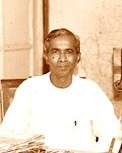Prafulla Chandra Ghosh
Prafulla Chandra Ghosh (24 December 1891–18 December 1983) was the first Chief Minister of West Bengal, India. He was the Chief Minister in two West Bengal governments, first in the Indian National Congress government from 15 August 1947 to 14 August 1948, then in the Progressive Democratic Alliance Front government from 2 November 1967 to 20 February 1968.[5]
Prafulla Chandra Ghosh | |
|---|---|
 Prafullachandra Ghosh at Writers' Building in 1947 | |
| 1st Chief Minister of West Bengal | |
| In office 15 August 1947 – 22 January 1948 | |
| Preceded by | Office established |
| Succeeded by | B. C. Roy |
| In office 2 November 1967 – 20 February 1968 | |
| Preceded by | Ajoy Kumar Mukherjee |
| Succeeded by | President's Rule |
| Personal details | |
| Born | 24 December 1891 Maliakanda, Dohar, Dhaka, British India (Now Bangladesh)[1][2][3][4] |
| Died | 18 December 1983 Calcutta, India |
| Political party | Indian National Congress |
Early life
Prafulla Ghosh was born in a Yadav family on 24 December 1891 at a remote village, Malikanda, in Dhaka district, British India (now Bangladesh) as son of Purna Chandra Ghosh and Binodini Devi. Both his parents were religious devout and simple persons. Prafulla Ghosh was a brilliant student throughout his academic life and always stood first with scholarship. Prafulla had very rural upbringing and enjoyed cultural festivals such as Jatra, Kirtan, Padavali Gan, and also participated in agricultural activities [6].
Prafulla first attended Jagannath College and then moved to Dhaka where he graduated with B. A. (First Class First) and B. Sc (Chemistry) in 1913. In 1916, he obtained his M. A. and M. Sc (Chemistry) as first class first in both. Immediately, he joined research in Chemistry at Dhaka University. In 1919, he joined Presidency College, Calcutta as Demonstrator. In Jan 1920, he started work at Calcutta Mint as ASA master and he was the first Indian to be employed in that position. He was awarded doctorate in 1920 in Chemistry by Calcutta University. [7]
Political life
Ghosh developed an interest in the Swadeshi Movement early on, but was most impressed and inspired by the ideas of armed revolution propagated by the Dhaka Anushilan Samiti, which he joined in 1909. However, the methods of the Samiti for raising money through theft and then defending the same in Court eventually alienated him, and he finally quit in 1913 to focus on academia. During the same time, while working for the Damodar flood relief, he met Surendranath Banerjee and other moderate leaders. Yogendra Nath Saha introduced him to the non-violent principles of Mahatma Gandhi. At the beginning, Gandhian principles did not impress him but he was moved by Gandhi's speech at Dhaka in December 1920 and soon afterwards met with him in Calcutta. In January 1921, he resigned from his position at the Calcutta Mint and along with other members of the Anami Sangha joined the Freedom Struggle.[8]
Family
His great-granddaughter is Priyanka Yoshikawa, who won the 2016 Miss World Japan contest.[9]

Bibliography
- The theory of profits
- India as known to ancient and mediaeval Europe
- Mahatma Gandhi, as I saw him
- West today
- Jībana-smr̥tira bhūmikā
- Mahātmā Gāndhī
- Prācīna Bhāratīẏa sabhyatāra itihāsa
References
- Kantho, Kaler. "এবার মিস জাপান হলেন বাংলাদেশি কন্যা প্রিয়াঙ্কা - কালের কণ্ঠ".
- "দোহারের মেয়ে প্রিয়াঙ্কা হলেন মিস জাপান - daily nayadiganta". The Daily Nayadiganta.
- "আমাদের - Kaler Kantho". www.kalerkantho.com.
- "জাপানের সেরা সুন্দরী প্রিয়াংকা দোহারের ঘোষ পরিবারের মেয়ে - নগর-মহানগর - Jugantor". www.jugantor.com.
- Modern Bengal A Short History of Bengal. Retrieved 18 April 2009.
- Ghosh, Praphullachandra (1976). Jībana-smr̥tira bhūmikā. Kalikātā: Maḍārṇa Buka Ejeṇsī. pp. 3–5. OCLC 20496530.
- Ghosh, Praphullachandra (1976). Jībana-smr̥tira bhūmikā. Kalikātā: Maḍārṇa Buka Ejeṇsī. pp. 18–20. OCLC 20496530.
- Ghosh, Prafulla Chandra (1960). Jiban-smritir Bhumika. pp. 21–22.
- Kantho, Kaler. "বাংলাদেশি বংশোদ্ভুত প্রিয়াংকাকে নিয়ে ভারতে মাতামাতি - কালের কণ্ঠ" (in Bengali). Retrieved 10 September 2016.
| Political offices | ||
|---|---|---|
| Preceded by (new post) |
Chief Minister of West Bengal 15 August 1947 – 14 January 1948 |
Succeeded by B. C. Roy |
| Preceded by Ajoy Kumar Mukherjee |
Chief Minister of West Bengal 2 November 1967 – 20 February 1968 |
Succeeded by President's Rule |